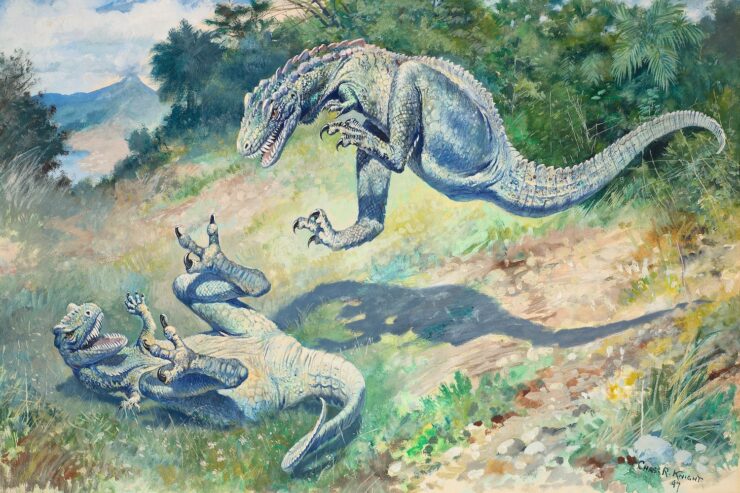As astonishing as it may sound, there are many people who do not have a favorite dinosaur. Indeed, not only do these people rarely think about dinosaurs, in some cases it seems that they never think about dinosaurs at all! For the rest of us, however, there’s a lot of dinosaur-related fiction. You might be interested the following five prose works1, old-time and modern, that scratch that dino-loving itch.
The Lost World by Arthur Conan Doyle (1912)
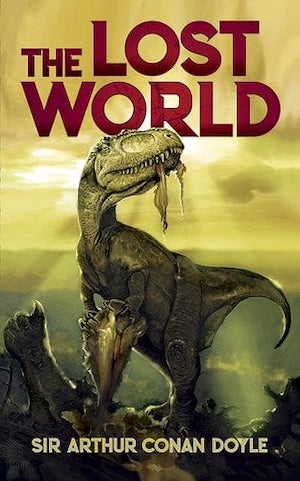
Exuberantly bearded Professor Challenger is convinced that dinosaurs survive somewhere in South America and that he can prove it. Reporter Edward Malone is convinced that he can win the clearly un-smitten Gladys’ heart with a sufficiently bold display of courage, such as accompanying Challenger to South America.
One of the two men is correct. Happily for the reader, that man is Challenger. Deep within the Amazon basin is a plateau2 and on that plateau live many otherwise extinct species, from dinosaur species to primitive humans. Fame and glory are Challenger’s… if he and his companions live long enough to escape the plateau.
Modern readers curious about Edwardian-era paleontology or virulent bigotry need look no further than this novel. Curiously, although Doyle wrote later Challenger books, his protagonist never returned to the plateau or if he did, Doyle never saw fit to document it. Perhaps the author felt that reprising The Lost World would cheapen it.
“A Sound of Thunder” by Ray Bradbury (1952)
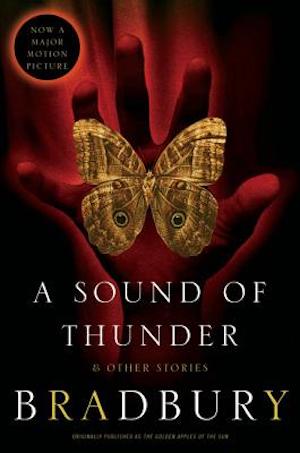
In the 21st century, dinosaurs are still just as extinct as they were in 1952. But thanks to the development of time travel, dinosaurs are far more accessible than they were in 1952. For the reasonable sum of $10,000, Time Safari Inc. will convey avid hunters back in time to bag a dinosaur.
Not being complete idiots, Time Safari avoids changing the past, lest their present be altered as well. Only dinosaurs fated to die from other causes are targeted by hunters. Countermeasures are deployed to protect the present from Jurassic errors. And if these protections should fail? What possible difference could Eckels’ brief foray off the prescribed path make to the world of 2055?
In Eckels’ defense, allowing time safaris despite knowing history is not fixed was as sensible as building a nuclear reactor with a positive void coefficient. In any case, this story contains a reference to “To the Future,” another Bradbury tale about time travelers escaping from the 21st century into the past. Perhaps even the “good” version of the future wasn’t all that good.
The Shy Stegosaurus of Cricket Creek by Evelyn Sibley Lampman (1955)
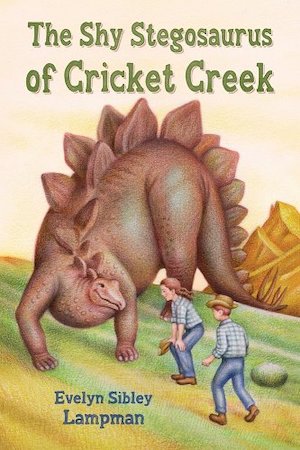
Joan and Joey are alarmed to encounter a rattlesnake and astonished to be saved from the snake by a passing stegosaur named George. Surely stegosaurs are extinct? As George explains, his kind are not extinct at all, merely terribly shy… which probably also explains why no human knew stegosaurs could talk.
Having befriended the young siblings, George is determined to help them in other ways. As George is unfamiliar with human customs, hilarious misadventures are certain.
One has to feel sorry for the poor snake, on whose territory the children trespassed and whose reward for warning them off with a rattle is to get stepped on by George. Modern parents may wish to be aware that olden-time kids’ books could be surprising off-handed about death. Don’t get me started on Old Yeller.
Bones of the Earth by Michael Swanwick (2002)
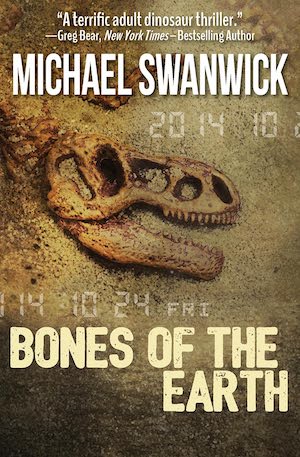
Offered time travel by the mysterious far future entities known as the Unchanging, paleontologist Richard Leyster and his colleagues can hardly say no. Heretofore, dinosaurs and their ilk were known only from fossils. Thanks to the Unchanging, whoever or whatever they are, researchers can investigate extinct species in person in the distant past.
Who are the Unchanging? Why do they want to help 21st century paleontologists? And how long will it take before time travel is sullied by human obsessions and politicking? All these questions are answered in time.
It takes about as long as you would expect for the humans to determine which model of time pertains. Alarmingly, it seems to be the single, alterable, timeline version. That version often ends badly for time travelers and their civilization. However, unlike Bradbury’s authorities, the Unchanging have countermeasures to protect their own timeline that actually work.
Into the Storm by Taylor Anderson (2008)
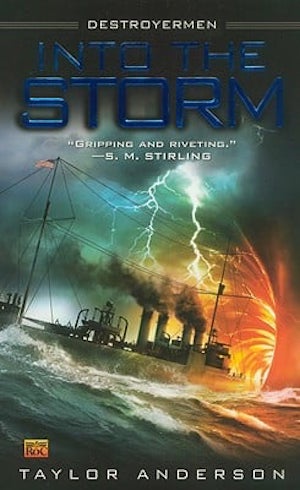
Following the disastrous Battle of the Java Sea, antiquated destroyer USS Walker flees the more modern, much larger, heavily armed Japanese battlecruiser Amagi. A storm offers respite from the pursuer…at the cost of conveying USS Walker across the timelines to a world quite unlike that of the 1942 they know.
The dinosaurs in this world did not go extinct. They thrived. Amongst the dinosaurs’ modern offspring are the intelligent Grik. Grik are as bellicose as they are cunning and their relentless expansion has forced the equally intelligent, more peaceful mammalian Lemurians to flee east. Now the Grik are encroaching on the Lemurian’s final redoubt. Doom seems certain… unless the USS Walker can turn the tide.
If there is just one lesson embattled primates fending off implacably hostile intelligent dinosaurs should take from Destroyerman, it is this: always be the cuter (even better, sexier) of the two sides involved in a war to the death if there is even the smallest chance humans from another timeline might happen by. Humans are often heavily armed and almost always suckers for cute.
Speculative fiction authors have loved dinosaurs ever since the ancient behemoths were recognized for what they were. The above is only a very small sample of the works I could have mentioned3. Are there works overlooked that inspire that special tingle? If so, please mention them in comments below.
- My focus on prose means that the TV series Primeval and its Canadian spin-off Primeval: New World get relegated to a footnote. Probably for the best, as it might be difficult to convey to non-Canadians how alarming was the implication that access to and control over history itself was now in the hands of the then-prime minister. ↩︎
- It is best not to ask questions about the book’s geology. It is also better not to wonder how primitive hominins known nowhere else in the New World got to that plateau. ↩︎
- Dinosaur Sanctuary was omitted because I have not yet read it. McCaffrey’s Dinosaur Planet was omitted because I couldn’t find a nice way to say, “it’s terrible.” ↩︎










